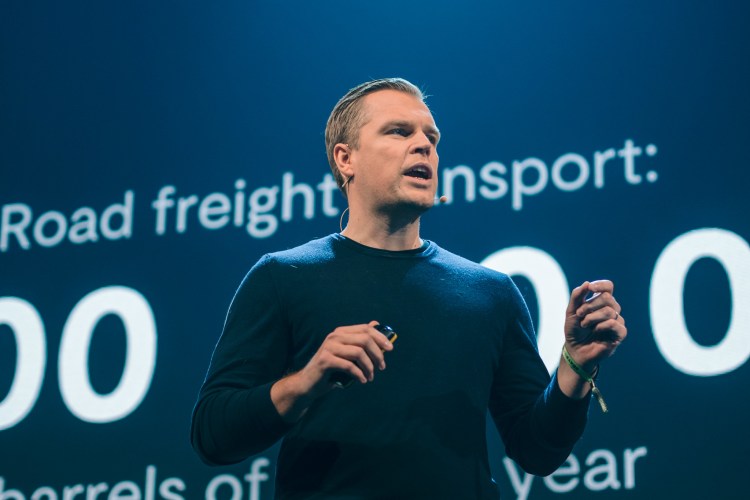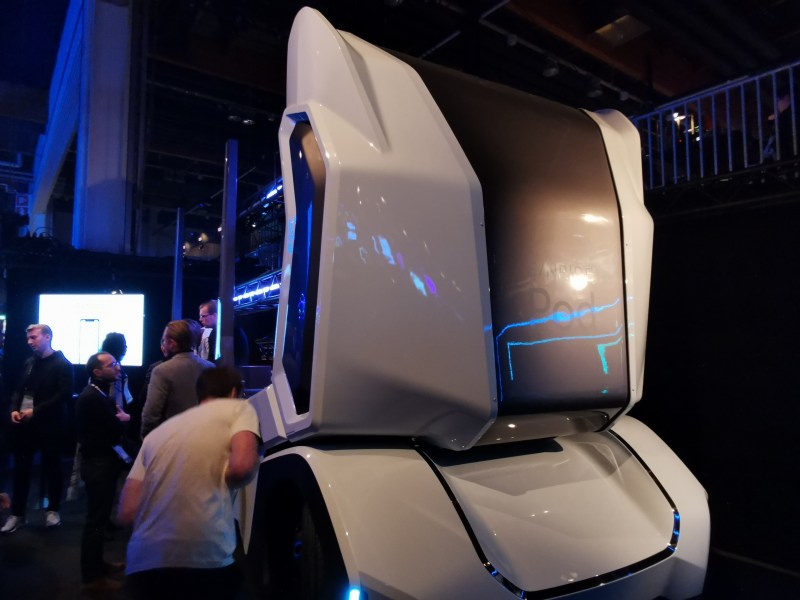While much of the initial hype surrounding autonomous vehicles focused on cars, that attention has decisively shifted towards self-driving trucks. The founder of one autonomous truck startup says there’s good reason to believe that an industry that moves freight is likely to take the lead in this mobility revolution.
“We address a market that yearly uses more than 5 billion barrels of oil just transporting goods,” said Robert Falck, CEO of and founder of Einride. “We actually have an opportunity now, and I consider it to be the biggest business opportunity in the history of mankind, to rethink how we do transport, creating a better solution for tomorrow.”
Falck spoke recently at the Slush technology conference in Helsinki, Finland. Based in Sweden, Einride has developed self-driving electric shipping vehicles that use its software platform as well as its autonomous, electric Einride Pods that are modular and can be adapted to suit various loads.
June 5th: The AI Audit in NYC
Join us next week in NYC to engage with top executive leaders, delving into strategies for auditing AI models to ensure fairness, optimal performance, and ethical compliance across diverse organizations. Secure your attendance for this exclusive invite-only event.
Einride raised $25 million in October as it begins to commercialize its technology. It faces a market that has become crowded with competition. Companies such as Starsky Robotics, Thor Trucks, Ike, Pronto.ai, Aurora, and TuSimple are building self-driving trucks. Automotive giants such as Daimler and Volvo have also developed their own self-driving shipping vehicles.
Falck said today’s shipping industry remains woefully behind in terms of adopting many of the most basic technologies, making it ripe for disruption.
“Today’s solutions are not very intelligent and not very sustainable, and they are using technology that was invented more than a century ago,” he said. “They still haven’t digitalized for a new era.”
He describes the Einride system as “intelligent and sustainable transport” that will lower costs through more effective planning and tracking of shipments, reducing energy consumption and accidents.
“We have the potential to rewrite an entire transportation sector,” he said. “The transport services market is more than two thousand billion dollars over the next 10 years. We have the potential to lower the cost by more than 50%.”
What also makes shipping a rich target is its predictability. About 80% of all delivery trips are repetitive, using the same vehicles taking the same routes again and again. That lowers the technical hurdles for an autonomous truck because there is less information it needs to learn about roads and conditions. “That means that you can apply logic to that market in a completely different way than you do for autonomous cars,” he said.
Einride spent about $10 million in its first three years creating the initial version of its autonomous truck. Because it doesn’t have a cab, its lower weight allows it to run longer on a single charge, Falck said.
Last May, Einride debuted its truck at the Swedish facility of logistics giant DB Schenker. The Einride pod is now hauling goods from a warehouse and a terminal at the site. The company also recently signed a deal with Coca-Cola in Sweden to conduct a pilot that will see an Einride truck transport products from a Coca-Cola European Partners’ facility near Stockholm to a partner’s warehouse in the region.
While longer range autonomous technology will still require more dramatic advances, Falck said self-driving trucks are ready to start making an impact now. As someone who previously worked in the traditional automotive industry making engines that contributed so much to global warming, Falck said he personally feels an urgency to reverse the environmental damage.
“We live in the age of disruptive technology,” he said. “Previously, we didn’t always understand what kind of future we were creating by making diesel and fossil fuel-based engines the backbone of our modern society. But we need to be able to create something different for the next century.”




